



-
- Free Word Search




When selecting a UPS, I think everyone would like to compare and consider a better UPS. But what exactly does a "better UPS" mean?
The answer to that question is that what makes a "good UPS" depends on the user's requirements (what do you want from a UPS? what do you prioritize?). In this article, we'll explain what you want and what you prioritize, and what performance and specifications you should use to compare UPSs.
Power supply quality is a key performance factor for a UPS to ensure a stable power supply. From what perspective should you compare them?
Although the names for UPS vary depending on the manufacturer, there are several power supply methods. We will explain the differences between them in the case of SANYO DENKI.
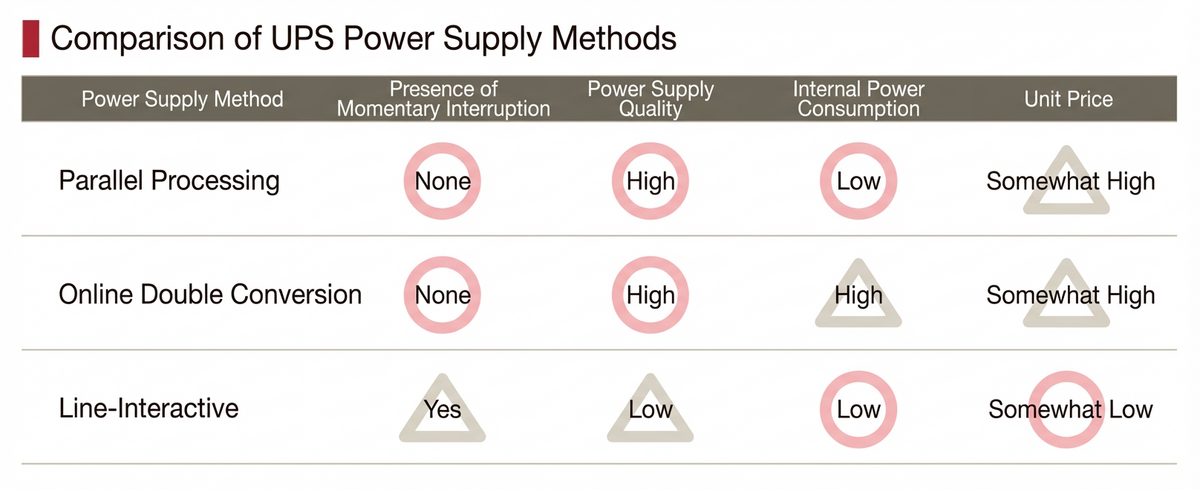
It has the following features: 1) It can supply power without interruption during a power outage, 2) There is no distortion of the waveform, and 3) It consumes little power. It is a power supply method that combines the best of the "Passive Standby" and the "Double Conversion Online." It is a power supply method recommended for those who want to keep running costs down while also prioritizing the reliability of the power supply.
Details page: What is Parallel Processing UPS?
・ SANUPS “E23A”: 20kVA to 200kVA Recommended for factory equipment, etc.
・ SANUPS “E33A”: 100kVA to 600kVA Recommended for factory equipment, etc.
It has the following features: 1) It can supply power without interruption during a power outage, and 2) There is no distortion of the waveform. However, it is relatively expensive among the four power supply methods and consumes more power. This is a power supply method recommended for those who prioritize uninterrupted power supply and reliable power supply over cost.
Details page: What is Double Conversion Online UPS?
-SANUPS "A11K": 1kVA to 5kVA Recommended for data centers, measurement systems, etc.
・ SANUPS “A11K-Li”: 1kVA to 5kVA UPS with lithium-ion batteries.
・ SANUPS “A11N”: 5kVA to 20kVA Recommended for data centers and server rooms.
・ SANUPS “A23C”: 30kVA to 300kVA Recommended for server rooms and factory facilities.
Its features are: 1) inexpensive, 2) relatively small, and 3) energy-efficient. On the other hand, its disadvantages are that when a power outage occurs, a "momentary interruption" occurs when supplying power, and waveform distortion is unavoidable. This is a power supply method recommended for those who prioritize price and energy saving and are OK with momentary interruptions.
Details page: What is Passive Standby UPS?
・ SANUPS “N11C-Li”: 1.5kVA to 5kVA Recommended for surveillance cameras, etc.
・ SANUPS『N11B-Li』: 1kVA to 3kVA dustproof and waterproof type. Outdoor compatible UPS.
It automatically switches between power supply quality priority mode (Double Conversion Online) and efficiency priority mode (Passive Standby) according to the power supply status. In power supply quality priority mode, power is supplied without interruption, and in efficiency priority mode, power consumption is reduced.
・ SANUPS “E11B”: 1kVA to 3kVA Recommended for servers, communication equipment, medical equipment, factory facilities, etc.
The next thing to compare is the reliability of the UPS itself (whether it will break down or not). The UPS acts as insurance in the unlikely event of a power outage, so you want to avoid the UPS breaking down at that time! In that case, what performance and specifications should you compare?
A "parallel redundant system" is a system in which two or more UPS units with parallel operation function are connected in parallel, as opposed to a normal UPS that operates alone. In the unlikely event that a UPS fails, power can continue to be supplied from the other UPS units.
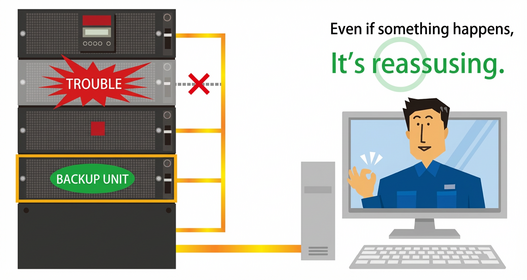
Details page: What is a parallel redundant type UPS?
It is recommended for locations where cutting off electricity is not permitted, such as data centers, server rooms, and precision equipment factories.
・ SANUPS “A11N” “A11N-Li”: 5kVA to 20kVA Recommended for data centers and server rooms.
・ SANUPS “E33A”: 100kVA to 600kVA Recommended for factory equipment.
SANUPS "A22A": 5kVA to 100kVA Recommended for data centers, server rooms, and factory facilities.
If you want to reduce running costs, you need to choose a UPS with a battery that has as long a lifespan as possible. A long battery life also has the advantage of reducing the maintenance work of changing the batteries. What performance and specifications should you check to achieve this?
There are two types of batteries installed in UPS: lead-acid batteries and lithium-ion batteries. Traditionally, lead-acid batteries were the norm, but in recent times they have been increasingly replaced by lithium-ion batteries. The battery life of a UPS varies depending on the usage environment and ambient temperature, but for traditional lead-acid batteries it is 2 to 5 years. On the other hand, lithium-ion batteries have a long life of 10 years.
Details page: A thorough comparison of UPS lithium-ion batteries and lead-acid batteries!

This is recommended for locations where the UPS is installed in a place where there is no administrator on a regular basis, such as servers and measurement systems, where maintenance is difficult and you want to reduce running costs.
-SANUPS "A11K-Li": 1kVA to 5kVA Recommended for data centers, measurement systems, etc.
・ SANUPS『N11B-Li』: 1kVA to 3kVA IP65 (waterproof and dustproof type). Recommended for outdoor use or in factories with a lot of dust.
・ SANUPS『N11C-Li』: 1.5kVA to 5kVA Passive Standby. Recommended for surveillance cameras, office PCs, etc.
When installing a UPS in a limited space, it is necessary to choose a UPS with a small body. Also, since a UPS is not a device that is used on a daily basis, it is better to choose a small one so that it does not get in the way. What performance and specifications should you check in order to do so?
As mentioned earlier, lithium-ion batteries have the advantage of being very small and lightweight, in addition to their cost and ease of maintenance. This allows the UPS unit that houses the batteries to be very small and lightweight. Some models can be made smaller to about half the volume*1 compared to lead-acid battery UPS, while others can be made about 40% lighter, weighing more than 30 kg*1. *1 Varies depending on capacity and backup time. Please contact us for more information.
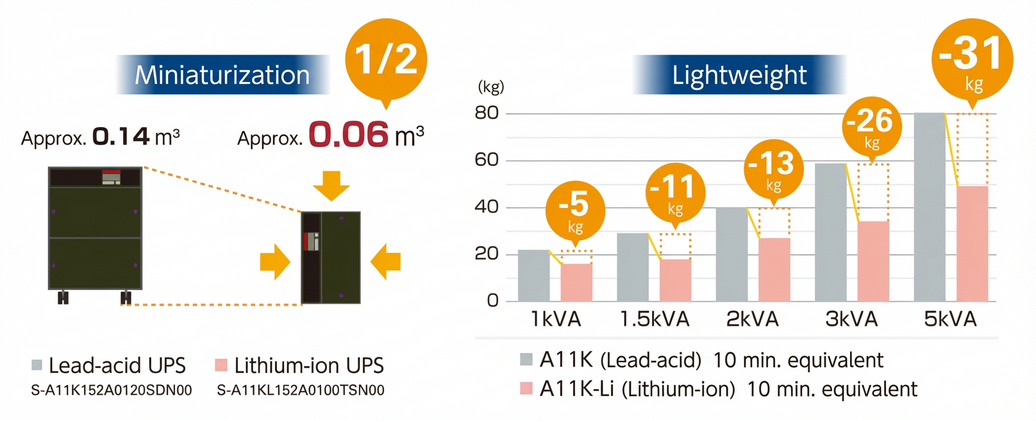
This is recommended when you want to install the unit in a limited space, such as when incorporating the unit into equipment or in factory facilities.
-SANUPS "A11K-Li": 1kVA to 5kVA Recommended for data centers, measurement systems, etc.
・ SANUPS『N11B-Li』: 1kVA to 3kVA IP65 (waterproof and dustproof type). Recommended for outdoor use or in factories with a lot of dust.
・ SANUPS『N11C-Li』: 1.5kVA to 5kVA Passive Standby. Recommended for surveillance cameras, office PCs, etc.
If I want to use a UPS outdoors rather than indoors, what performance and specifications should I check?
The IP code is a standard that indicates the waterproof and dustproof performance of electrical products. The first number after IP indicates the "dustproof class," and the second number indicates the "waterproof class." It is a good idea to select a UPS while checking whether it has the waterproof and dustproof performance you require.*2
*2 If the UPS is not waterproof or dustproof, it can also be installed outdoors by covering the surrounding area with a prefabricated building or similar.
How to read and chart the protection grade
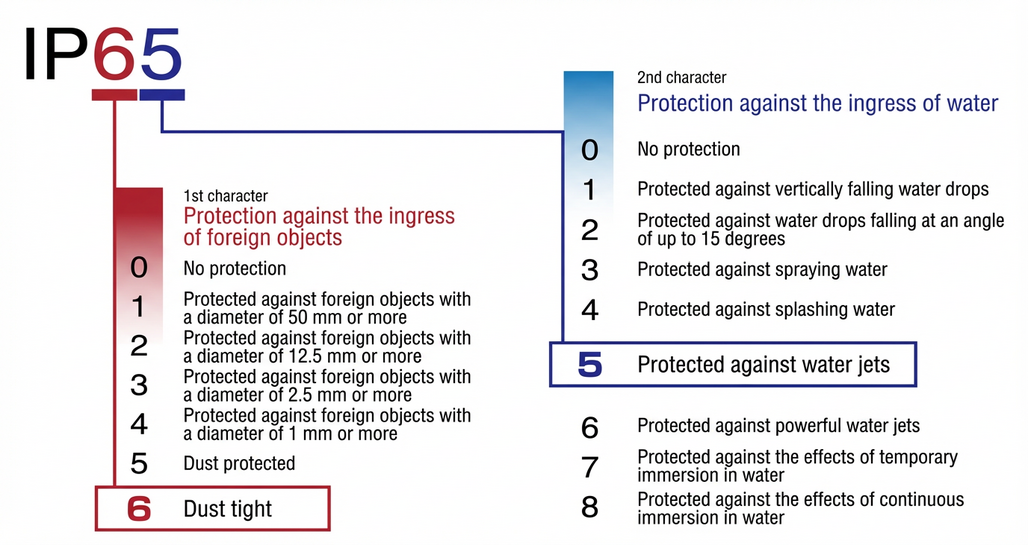
Also, if you plan to install the product outdoors in a cold or tropical region, make sure that the "operating temperature range" is appropriate for the installation area.
Backup for outdoor equipment such as security cameras. Also recommended for use in dusty factories such as food factories.
・ SANUPS “N11B-Li”: 1kVA to 3kVA
IP65. Operating temperature range: -20 to 50°C. Recommended for outdoor use or in dusty factories. Also suitable for cold and tropical regions.
What should I check if I want to install a UPS outside of Japan?
To determine whether a product meets overseas safety standards, check the certification mark. "UL Standard" is a product safety standard established by the American Underwriters Laboratories Inc. (UL). "CE Marking" is a mark that indicates that specified products sold in the EU comply with EU standards.
When selecting a UPS to be used overseas, it is necessary to check whether the UPS is compatible with the local voltage. It is also necessary to carefully check the transportation method, usage environment, load, etc.
Details page: Explains precautions and safety standards when using UPS overseas!
・UL/CE standard: SANUPS “E11B”, SANUPS “A11N” (partial)
・UL standard: SANUPS “A11K-Li”
・CE standard: SANUPS “N11B-Li”, SANUPS “A22A”
So far, we have explained the performance and specifications to compare in order to select the "better UPS" for each user's needs. Finally, we would like to introduce some of the features of our SANYO DENKI UPS.
SANYO DENKI is a long-established UPS manufacturer that developed Japan's first UPS in 1956 (Showa 31). With the know-how accumulated over this long history, we have built a manufacturing and support system for products that meet the strict quality requirements of our customers. SANYO DENKI 's UPS has been used for many years in industries that require high reliability, such as the communications industry and government agencies.
Because it uses long-life components, the lifespan of a SANYO DENKI UPS unit is 7 to 15 years, although this varies depending on the usage environment and ambient temperature, while the lifespan of a typical UPS unit is said to be 5 to 10 years.*3 In addition, because the UPS has a wide input/output range, the number of times it switches to the battery can be reduced, and the battery life can be maintained as expected.
*3 Products currently on sale as of March 2023
SANYO DENKI 's UPS uses a highly efficient Inverter, which helps to minimize power loss. While the conversion efficiency of a typical UPS is said to be in the upper 80% range, SANYO DENKI 's UPS is around 94%. This allows businesses to save on electricity costs.
SANYO DENKI 's UPS not only protects against power outages and voltage drops, but also includes models that can suppress harmonics generated by plating equipment, machine tools, etc. They are also useful in situations where higher power supply quality is required.
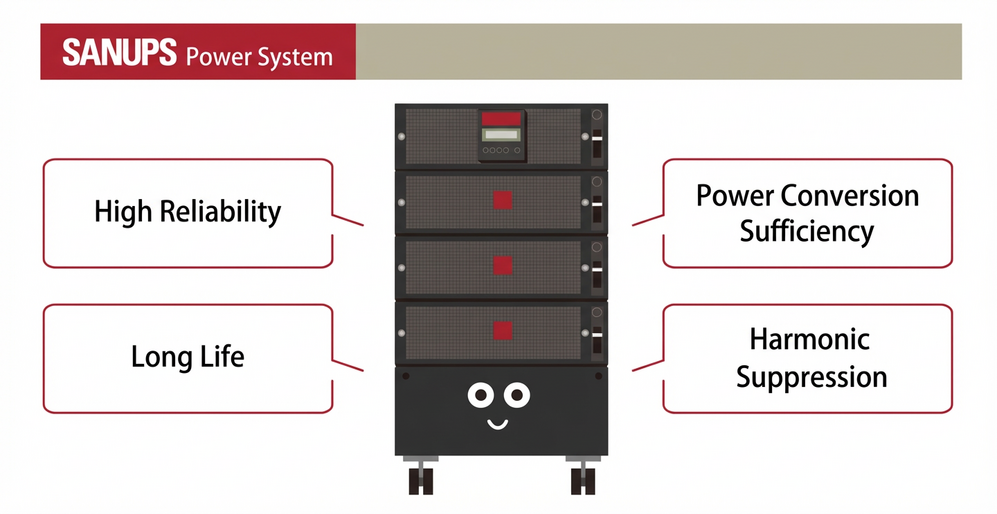
If you have any requests such as "I would like to compare the UPS I selected with other UPS,""I would like to compare the UPS I am currently using with other UPS,"or "I would like help choosing the perfect UPS," please feel free to contact us at any time. We look forward to hearing from you.
Supervisor: Dr. Kiyotaka Izumiya, Senior Technical Advisor, Sales Department SANYO DENKI CO., LTD.
Update date: /release date: